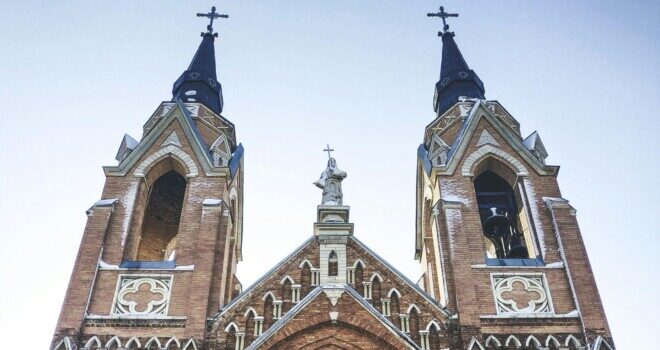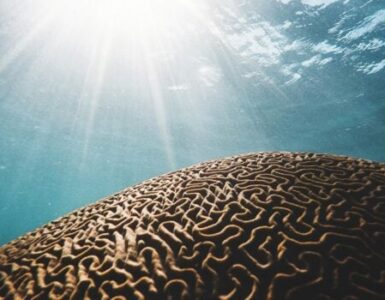Our Lord asked “that they may also be in us.” (John 17:21)
Christian unity occurs when we participate as one Body in the Life of the Blessed Trinity. The Life of the Trinity dwells within us when we participate in the life of grace offered by the sacraments. This life of grace is bestowed upon us in Baptism, strengthened in Confirmation, and can be renewed even daily if we receive Christ in the Holy Eucharist and are cleansed of our sins in Confession.
Our Lord prayed “that they may all be one; even as thou, Father, art in me, and I in thee, that they also may be in us, so that the world may believe that thou hast sent me” (John 17:21 [emphasis added]). True unity is visible, doctrinal, and spiritual.
When will Muslims, pagans, Jews, and atheists believe in the Lord Jesus Christ? It seems unlikely to occur until at least all Christians are united under His universal pastor, the pope, and His bishops.
The Catholic Church was not founded by a mere human being; it was founded by God incarnate. It is the one true Church of Jesus Christ because: 1) the Catholic Church is the only Christian Church that goes back in human history to Christ Himself; 2) the Catholic Church is the only Christian Church that possesses invincible unity, intrinsic holiness, continual universality, and the indisputable apostolic foundation that Christ said would distinguish His true Church; 3) the apostles and Church Fathers, who certainly were members of Christ’s true Church, all professed to be members of this same Catholic Church; and 4) the Catholic Church alone possesses the four marks of one united Church, for she is not a collection of competing churches, holy, for she is the Bride of Christ, catholic, for she is a universal whole Church founded on every continent preaching the same Gospel message, and apostolic, for she came from Christ through the apostles. (The commas between these characteristics matter! All four must be present.) The Holy Mass that occurs daily all around the world is the same.
There are only two religions in the history of the world that have been started by God: Old Testament Judaism and New Testament Catholicism. Judaism is pre-messianic Catholicism and Catholicism is post-messianic Judaism. The Church is the extension of the Davidic Kingdom of Christ through Peter. All seven sacraments of the Catholic Faith are based on Jewish roots.
The Catholic Church is the only Church that has authority given to her by God Himself. No church founded by a mere mortal can show a single Bible verse that gives the authority to found another church other than the one founded by Jesus Christ. The Most Holy Trinity did not authorized any human being to start a church. If any person would have been given these credentials to start a church, it would have been St. Paul. In Gal 1:11-12, he states he was not taught the Gospel but received it through Divine Revelation from Jesus—yet even Paul followed the authority given to Peter and those in repute. (See Acts 15 and Galatians 1:18.)
The Catholic Church’s Magisterium is the spiritual government set up by God to teach, govern, and sanctify every man, woman, and child. St. Paul reminds us, “Let every person be subject to the governing authorities. For there is no authority except from God, and those that exist have been instituted by God. Therefore, he who resists the authorities resists what God has appointed, and those who resist will incur judgment” (Rom. 13:1–2 [emphases added]). To reject Christ’s Church is to reject God’s authority over humankind.
Is it intellectually honest to think that the Holy Spirit is teaching something different to thousands of other Christian denominations founded by mere mortals and not by Jesus? No; Jesus Christ founded only one Church and entrusted to her the fullness of grace and Truth.
Does God err? Of course not. So why is there disunity? Why are there tens of thousands of U.S. tax code non-defined “churches” in the United States? The answer is basic and simple. Virtually every one of these “churches” teaches something different based on the private interpretation of its founder or pastor. Most will readily admit that they do this.
What is the problem with plurality of Christian denominations? Our Lord was very clear when saying, “So there shall be one flock, one shepherd” (John 10:16 [emphasis added]). Unity is necessary and a prerequisite from Christ. The Decree on Ecumenism from Vatican II states that “division openly contradicts the will of Christ, scandalizes the world, and damages the holy cause of preaching the Gospel to every creature.”1 Schism is a wound to the Body of Christ.
We can easily see today how far we are from unity. Yet we do not believe that the Triune God would ever sanction division in His Church.
The words Catholic Church, first utilized by St. Ignatius of Antioch, in Greek are ekklesia katholikos. Katholikos is derived from combining two words, kata meaning “concerning” and holos meaning “whole.” So, it literally means “regarding the whole,” or is simplified as “universal.” Ekklesia means “those called out”; therefore, today’s Catholic Church is comprised of those clergy and laity who were called out by Christ to gather into His universal Body.
To truly believe in Christ means to desire unity and to desire unity means to desire the true Church. Let us pray for and work to bring about that unity—the healing and reunification of Christ’s Body on earth.
Editor’s Note: This article was adapted from the book One Lord, One Faith, One Church by Paul Zuccarelli and Jesse Romero, available from Sophia Institute Press.
Photo by Pavel Neznanov on Unsplash
1Vatican Council II, Decree on Ecumenism Unitatis Redintegratio (November 21, 1964), no. 1; emphasis added.










